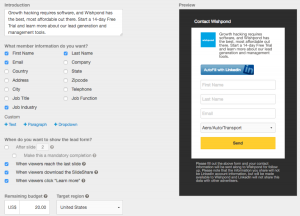Regardless how many search marketing experts preach the obvious, individuals (even those in SEO) still aren’t getting it: you’re nuking your search position by virtue of unskilled tactics that are, quite frankly, an embarrassment to my craft.
Admittedly, the title alone appears haughty when webmasters seek more strategic search marketing approaches to append to their client’s marketing campaigns, post-HummingPanda (new word I coined). If your new to search marketing for other businesses, this article will serve as overwhelming proof that screwballs exist around you who’ll do anything to nuke their clients’ search position – then charge them more to fix it.
Should an entrepreneur, small business or even large corporate eye fall onto this article, take heed to the destructive causes of your search engine results page (SERP) position slippage:
You, your competition, or someone is doing negative SEO
Negative SEO? Well, perhaps ‘derogatory keyword strategy’ is much more fitting for this section.
Either way, let’s say your website domain name has ‘hosting’ in the title. You embark on your maiden voyage into the link building realm, contacting webmasters near and far about writing articles, placing contextual links, etcetera. Your trusty steed, who we’ll call SEO Firm ‘A’, finally decides to settle for an awesome poker forum where, of course, they discuss the many splendors of playing Texas Hold ‘em while slipping your hosting link into the conversation.
They just sealed an eventual spam penalty for your site, yet ‘conveniently’ forget to tell you where they’ve been link building – you just sign their paycheck and go about daily activities. Two months later, your site is de-indexed.
Maybe it’s you accidentally thinking 20,000 random links are going to be looked upon favorably by Google. Don’t blame yourself if this is the case – but I’d suggest an immediate plan (like disavow everything and start over) to help revive your website. I personally have Kirill Storch, marketing genius and SnapScout CCO, to thank for discussing various black hatting snafus such as link blasting.
Negative SEO, in and of itself, is the act of imposing your presence in Google before its due time. It’s trying to scream in Google’s ear when a simple whisper will do the trick. It’s also the act of deliberate sabotage by means of endlessly pinging Google, purposely building irrelevant links and spinning content that originated from your site – then backdating it to reflect your content being newer than the spun crap you have no control over.
Content is repetitious. Or outdated. Or factually incorrect.
Writing about various business disciplines repetitively doesn’t make your website popular – it breeds boredom. Honestly, there’s only so many ways to discuss ‘how to do’ anything before it becomes mindless drivel. Here’s a little inside secret: we don’t care why health insurance is important. Or why having 20 million Twitter followers is vital to business survival.
Just. Stop. It.
Content diversity, which entails actually writing about things that aren’t widely spoken about or continuously rehashed, is rarely practiced anymore since businesses are misled into believing ramming keywords down visitors’ throats will win valuable search position. As business owners and marketing company heads, we’re driven by ‘forecasts’. Analytical data. Average time on website. With a more diverse selection of engaging content, the average time on site metric grows, and analytical data is more fun to read. More importantly, decent content gets shared.
In case you’re stacking crabby patties to purchase an article spinner, know in advance that Google’s many ongoing content proliferation projects are now able to sniff out obvious attempts at writing content that’s slammed full of phrases, keywords and links that mean nothing. Continue your content spinning tirade, and watch a site’s value, traffic and position fade away quickly.
Hocus, pocus. You need content to focus.
Directory submissions. Many, many directory submissions.
I was approached last week by someone offering a Fiverr gig doing massive mounds of directory submissions. Five bucks may seem like pocket change, but the residual damage links on these sites will do to your blog or business site are horrendous at best.
Many directories that lack relevance, sustenance or validity whatsoever have already been nuked; Penguin and Panda made sure of this. They’re still operational (albeit ineffective), thereby making any sites linking to them, or from them, intoxicated with filth. We cordially invite anyone that wishes to immediately invoke manual website action from Google to link to these directories.
PBN (paid blog networks), which could be loosely seen as farms where good content goes to die, aren’t much safer, although they’re generally seen as ‘data aggregators’. Sites like Social Media Today and similar generally allow your feeds to be submitted while Technorati used to rank your site on various niche areas across their blogosphere. (We saw what happened there…)
Linking techniques are amiss
There’s a finite line between linking as a means to reference something similarly covered elsewhere within your content, and linking solely to harvest domain / page authority from higher ranking sites. Whereas the former may seem inconsequential to SEMs, it’s the most natural means to connect a continuous story – which, from the standpoint of the largest catalog of content on Planet Earth, is the only means one should ‘link out or in’.
Best practices mandate creation of a continuous story. If your business model involves manufacturing diodes, for example, it’s probably of little use to your SERP positional battle to connect with blogs discussing fluffy white clouds – that is, of course, unless there’s some useful connection between photodiodes and cumulonimbus composition.
When linking techniques go haywire, Google believes (by design) that some unnatural means of disrupting the heard is happening. This is where you’re receive an email at 3am disclosing why you’re site was given a manual penalty, with instructions on how to disavow these links and other steps needed before resubmitting your site for reconsideration.
You’re socially challenged
Don’t take the aforementioned heading as an attack on your femininity or machismo.
Another huge ranking factor, thanks to Google, is your presence across the social realm. For businesses, this means talking with your following minus the sales pitch. For entrepreneurs, it’s engaging with industry cohorts. For everyone, it’s the greatest means to establish trust both in the eyes of the consumer, and the search giants. Not to mention significant social signals both monthly, and daily, are given ‘points’ good towards an incremental boost in site popularity and trust. Trust and popularity across the social sphere mean more natural traffic will soon follow – as will you SERP rank.
Fail to establish some semblance of social presence, and you risk more than affording the opportunity for everyone to see your pretty face.
Really, It’s Not Hard
Realistically, misguided professionals lacking proper SEM insight could unknowingly obliterate their clients’ search position, domain name and – if not caught quickly – their entire business. What separates those who recover from those who offer more services for higher pay is how these penalties were brought about. Generally speaking, rookie marketers will practice optimization on $ 5 WordPress websites, perfect their craft, and then begin working for others. Shady marketers will ‘fake it to make it’, putting your site into a world of hurt, then beg you to retain them to fix things.
In case you didn’t read the memo, Google isn’t playing with black hat marketers anymore. Practicing tactics opposite of this article will always keep your clients, and your job, safe from unnecessary obstructions.
Digital & Social Articles on Business 2 Community(17)




